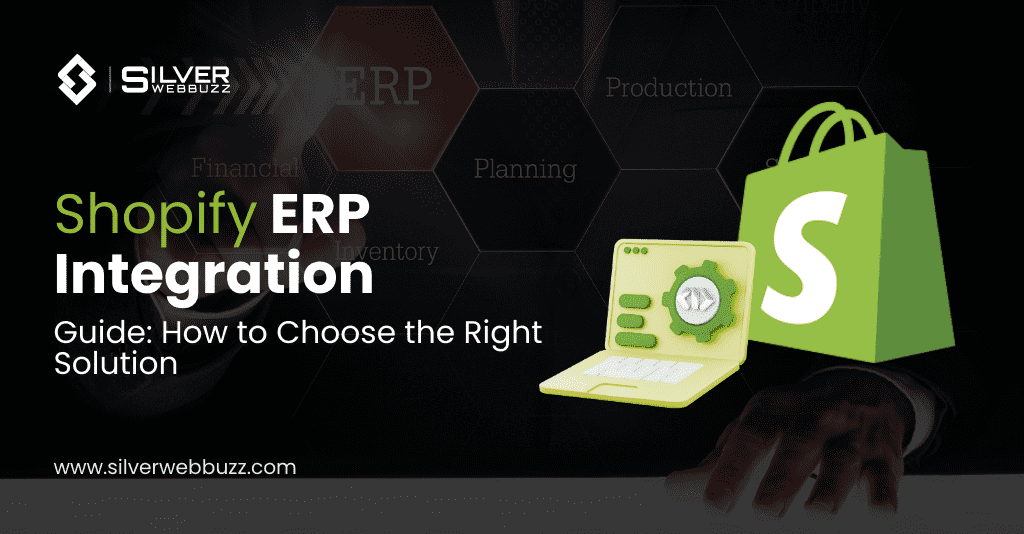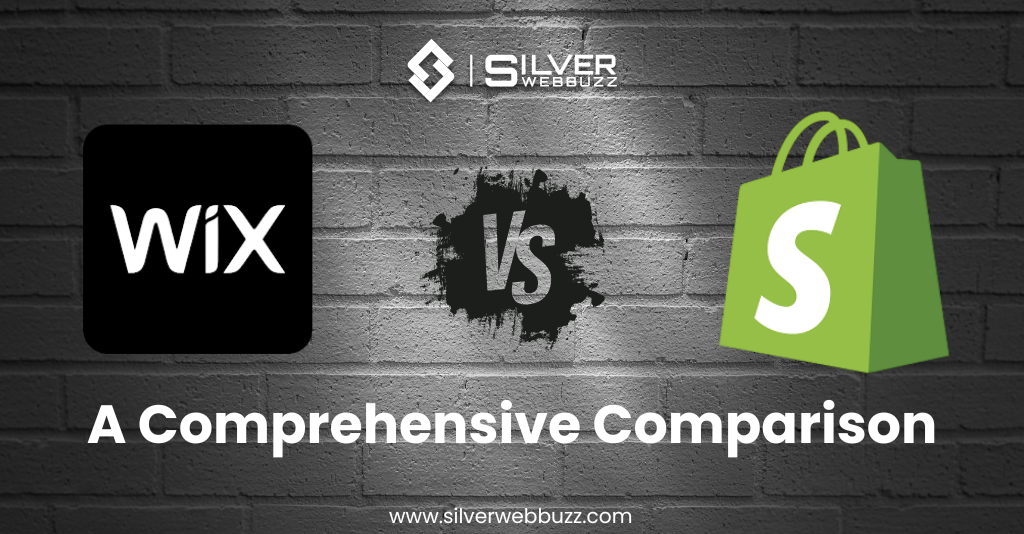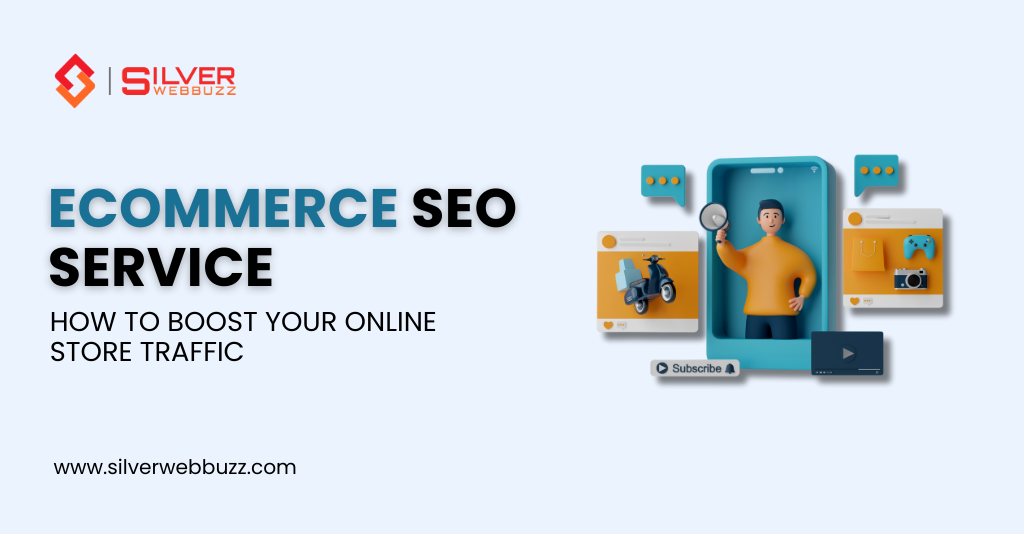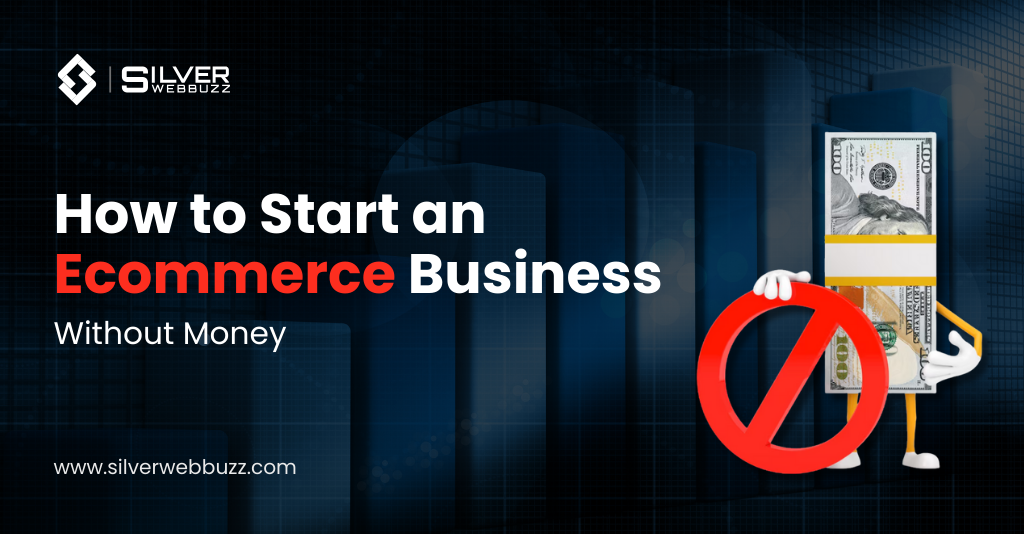In the competitive world of eCommerce, streamlined operations are the key to long-term growth. For Shopify-based businesses, managing inventory, sales, customer data, and accounting can be a challenging task without proper systems in place. This is where Shopify ERP integration steps in as a game-changing solution. By integrating an ERP system with your Shopify store, businesses can automate workflows, boost productivity, and offer better customer experiences.
Whether you’re an established business owner or just stepping into the Shopify ecosystem, understanding how Shopify ERP Integration works—and how it can impact your online store—is crucial. This article dives deep into the essentials of ERP integration with Shopify, discusses the top ERP systems, outlines critical features, and introduces you to expert Shopify development services provided by Silver WebBuzz, a trusted Shopify development company.
What Is Shopify ERP Integration?
Shopify ERP integration refers to the process of connecting your Shopify online store with an Enterprise Resource Planning (ERP) system. This connection allows data to flow seamlessly between your Shopify store and backend business systems such as accounting, human resources, customer relationship management (CRM), inventory, and order processing.
Instead of managing your store manually, which increases the chances of errors and inefficiencies, Shopify ERP integration automates many of these tasks. For example, when a customer places an order on your Shopify site, the ERP system instantly receives the order details, updates inventory levels, and initiates invoice generation or shipping processes.
The main objective of Shopify ERP integration is to centralize data and streamline operations for improved productivity and better business decisions. This is especially vital for scaling businesses that require efficient ERP integration to handle complex logistics and financial systems.
How Does Shopify ERP Integration Work?
The mechanics of Shopify ERP integration vary depending on the ERP system you choose and the complexity of your business operations. However, the general process includes:
- Data Synchronization: All relevant data such as product listings, stock levels, customer profiles, and orders are synchronized between the Shopify store and ERP system in real-time or scheduled intervals.
- Middleware or API Connections: Shopify’s open API enables ERP systems to connect directly or via middleware platforms that bridge the data transfer and mapping between both systems.
- Automated Workflows: Once integrated, actions like order confirmations, shipping updates, and financial entries are automatically processed by the ERP.
- Two-Way Communication: Modern ERP integration with Shopify supports two-way data exchange. Any updates made in the ERP, such as changes in pricing or inventory levels, are reflected instantly on the Shopify front end.
Hiring professionals through a reliable Shopify development company ensures this process is customized for your business and securely managed. Businesses often hire Shopify developers with experience in ERP to ensure a smooth and functional integration.
Types of ERP Systems for Shopify Integration
Integrating an ERP (Enterprise Resource Planning) system with Shopify is a strategic move for businesses aiming to streamline operations, manage inventory, and enhance overall efficiency. Different types of ERP systems are available, each tailored to specific organizational needs and technological preferences. Below are the main categories of ERP systems that can be integrated with Shopify:
1. Cloud-Based ERP Systems
Cloud-based ERPs are hosted on remote servers and accessed via the internet. These systems operate on a subscription model, which significantly reduces the need for heavy upfront investment in hardware or infrastructure.
Benefits:
- Easy to scale as your business grows
- Lower initial costs
- Regular automatic updates and security patches
- Accessible from anywhere with an internet connection
- Faster implementation compared to traditional systems
This type of ERP is especially suitable for Shopify merchants looking for flexibility, cost-effectiveness, and ease of access. It’s an excellent option for startups, small businesses, and rapidly growing eCommerce companies.
2. On-Premise ERP Systems
On-premise ERP solutions are installed and operated from a company’s internal servers and infrastructure. These systems provide full control over software and data, making them a preferred choice for companies with strict data security policies or highly customized business processes.
Benefits:
- Complete control over the software environment
- Customization to meet specific business needs
- Greater data security (if properly managed)
- No dependency on third-party hosting
However, they often require a higher initial investment, ongoing maintenance, and a dedicated IT team to manage the system. They are better suited for large enterprises with complex workflows and substantial internal resources.
3. Hybrid ERP Systems
Hybrid ERP systems combine the best of both cloud and on-premise solutions. This approach allows businesses to keep certain core processes on-premise while utilizing cloud functionality for other operations.
Benefits:
- Flexibility to run critical functions in-house while leveraging cloud advantages
- Scalable and adaptable to changing business requirements
- Balanced cost-efficiency and control
- Ideal for companies undergoing digital transformation
Hybrid ERPs are beneficial for mid-sized to large businesses that need more control than a fully cloud-based system offers but aren’t ready to commit entirely to on-premise solutions.
Top Security Features to Consider When Choosing an ERP for Shopify
When integrating an ERP system with your Shopify store, security should be a top priority. ERP platforms often handle sensitive customer information, financial records, order history, and internal business processes. Any vulnerability can expose your business to data breaches, fraud, or compliance violations.
To ensure safe and secure Shopify ERP integration, here are the key security features you should look for:
1. Data Encryption
All data exchanged between your Shopify store and ERP system should be protected using end-to-end encryption, typically via SSL/TLS protocols. This ensures that critical information—such as customer details, payment data, and business transactions—is securely transmitted and unreadable to unauthorized parties.
Tip: Opt for ERPs that also offer at-rest encryption to protect stored data.
2. Role-Based Access Control (RBAC)
RBAC allows you to assign access levels based on user roles, ensuring employees only access the data necessary for their responsibilities. For example, a warehouse staff member can view inventory details but not financial reports.
This minimizes the risk of internal threats and strengthens overall data governance.
Best Practice: Review access permissions regularly to maintain optimal security.
3. Two-Factor Authentication (2FA)
Two-Factor Authentication adds an extra layer of security during login by requiring a second form of verification—such as a mobile code or biometric scan. This significantly reduces the chances of unauthorized access, even if login credentials are compromised.
Bonus: Some systems support multi-factor authentication (MFA), offering even higher protection.
4. Regular Data Backups
An ERP system integrated with Shopify must support automated and frequent backups to protect against data loss caused by system crashes, cyberattacks, or human error.
Reliable backup systems ensure that your data can be restored quickly and accurately, minimizing downtime.
Ensure: Backup data is also stored securely and encrypted.
5. Comprehensive Audit Trails
Audit logs track all user activities, data changes, login attempts, and integration events. These logs offer full transparency and accountability within your system.
In case of a security breach or system malfunction, audit trails help in tracing the source of issues and provide critical documentation for regulatory compliance.
Pro Tip: Look for ERPs that offer customizable and exportable audit logs.
5 Leading ERP Systems Compatible with Shopify
If you’re running an eCommerce store on Shopify and looking to scale efficiently, integrating a powerful ERP (Enterprise Resource Planning) system can be a game-changer. Shopify ERP integration allows businesses to centralize operations, improve inventory management, automate order fulfilment, and gain better insights into business performance.
Here are five top ERP systems that integrate seamlessly with Shopify, known for their compatibility, scalability, and advanced features:
1. NetSuite ERP
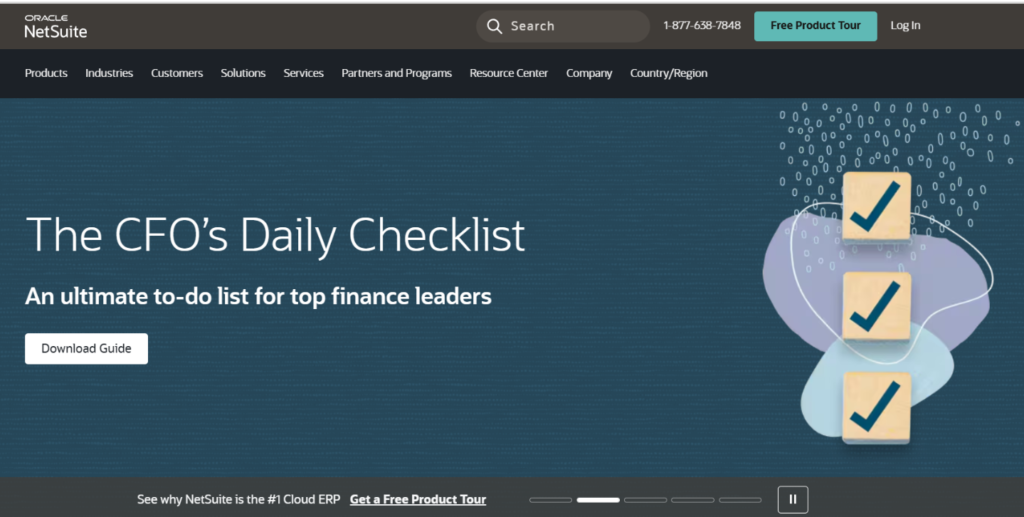
Oracle NetSuite is a leading cloud-based ERP solution widely adopted by fast-growing eCommerce businesses. It offers end-to-end automation for inventory management, financials, CRM, order processing, and supply chain operations.
With dedicated Shopify ERP integration apps and APIs, NetSuite ensures real-time data synchronization, helping you manage multiple sales channels, customer data, and product inventory all in one place.
Best for: Growing and enterprise-level Shopify stores.
2. SAP Business One
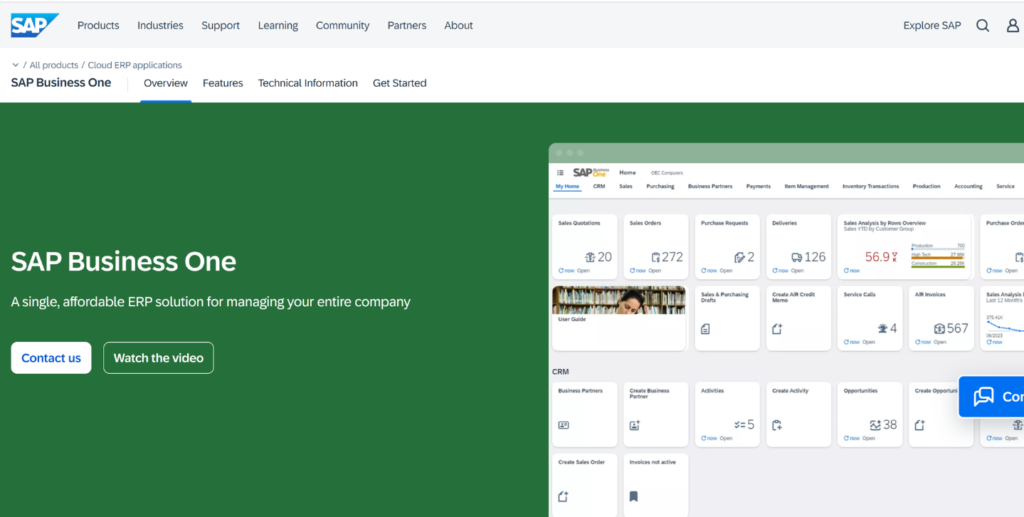
SAP Business One is a robust ERP solution designed for small and mid-sized businesses. It covers essential business functions such as accounting, purchasing, sales, and inventory.
When integrated with Shopify, it enables real-time syncing of orders, customers, and inventory, reducing manual processes and enhancing efficiency.
Custom ERP connectors or middleware like APPSeCONNECT can help create a smooth Shopify-SAP Business One integration tailored to your specific needs.
Best for: Mid-sized businesses with complex operational needs.
3. Microsoft Dynamics 365
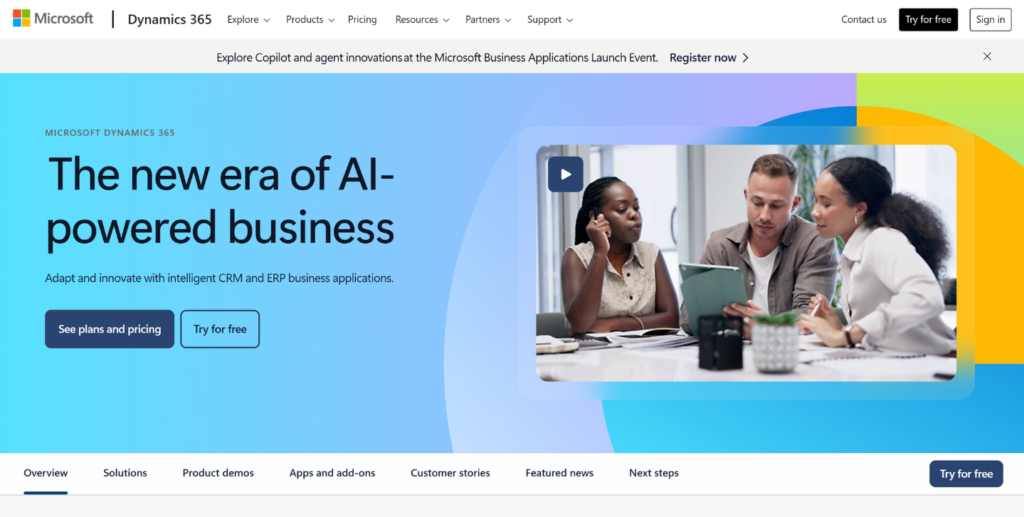
Microsoft Dynamics 365 combines ERP and CRM capabilities, making it one of the most flexible and powerful systems for eCommerce businesses.
Its AI-powered insights, workflow automation, and predictive analytics tools can significantly improve decision-making. Shopify can be integrated using custom APIs or third-party connectors like Microsoft Power Automate or Zapier, depending on your setup.
Best for: Businesses looking for advanced analytics and automation.
4. Odoo ERP
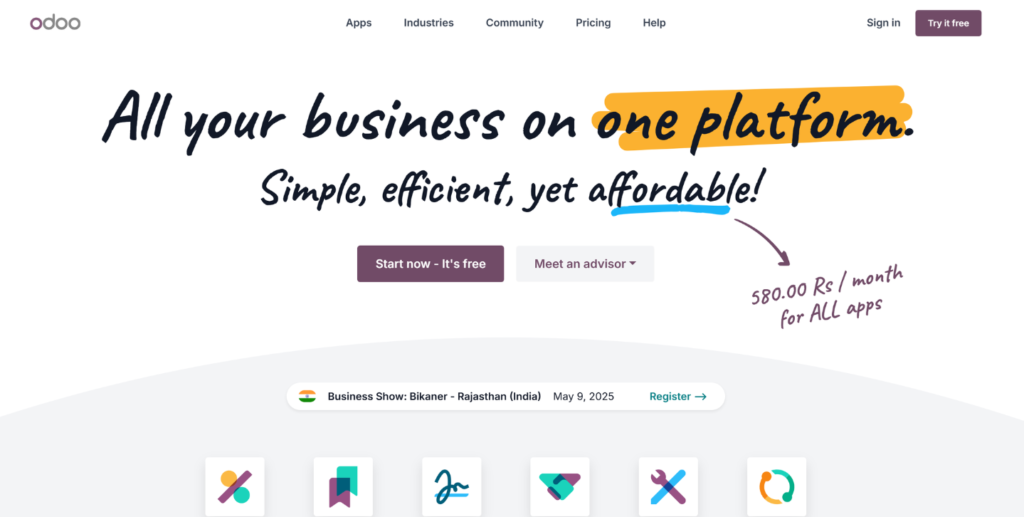
Odoo is an open-source ERP system offering highly customizable modules for sales, CRM, inventory, accounting, and more. It is cost-effective and ideal for companies looking for a modular approach.
Odoo’s Shopify integration allows for syncing of product catalogs, sales orders, and customer data, while also offering POS capabilities that enhance the omnichannel experience.
Best for: Businesses seeking open-source flexibility and modular scalability.
5. Brightpearl
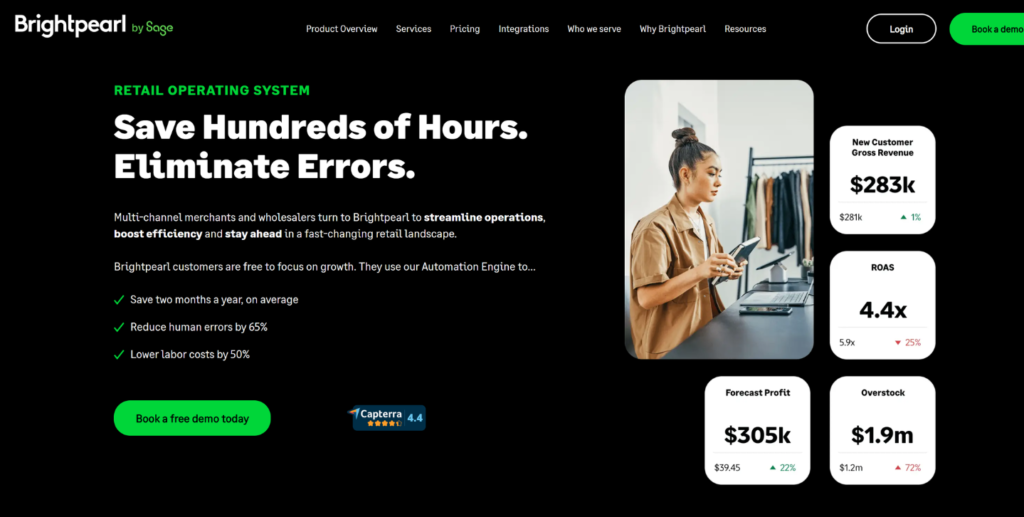
Brightpearl is built specifically for retail and eCommerce businesses. It offers native Shopify integration with features such as real-time inventory tracking, automated order management, warehouse control, and financial reporting.
It helps Shopify merchants streamline backend operations, eliminate errors, and scale rapidly without losing operational control.
Best for: Shopify-based retail brands and fast-scaling online stores.
Shopify ERP Integration Services at Silver WebBuzz
When it comes to reliable Shopify ERP integration, Silver WebBuzz is a name you can trust. As a leading Shopify development company, we specialize in building seamless ERP connections tailored to the unique needs of each client.
Our ERP integration services include:
- End-to-end analysis of business needs and ERP requirements
- Custom API development for real-time Shopify data synchronization
- Secure, encrypted data exchange between Shopify and ERP systems
- Real-time dashboard and reporting tool integration
- Ongoing technical support and ERP optimization
With 10+ years of experience and a team of certified developers, Silver WebBuzz ensures that your Shopify ERP integration is efficient, secure, and future-ready.
Additional Shopify Services at Silver WebBuzz
In addition to Shopify ERP integration, Silver WebBuzz offers a wide range of Shopify development services, including:
- Custom Shopify Store Development: Tailored themes, storefronts, and user experiences
- App Integration: Integration of third-party tools and apps to boost functionality
- Migration Services: Moving your store from other platforms like WooCommerce or Magento to Shopify
- Performance Optimization: Improving loading speed, responsiveness, and SEO
- Maintenance and Support: Regular updates, bug fixes, and backup management
If you’re planning to scale your business, now is the best time to hire Shopify developers who understand both technical and strategic aspects of Shopify.
Wrapping Up on Shopify ERP Integration
Shopify ERP integration is no longer a luxury—it’s a necessity for businesses looking to automate workflows, improve customer experience, and boost operational efficiency. From cloud-based ERP systems like NetSuite to open-source solutions like Odoo, there’s a wide variety of options to choose from based on your business goals.
Partnering with a skilled Shopify development company is crucial to getting your integration right. Whether you’re looking for robust data sync, advanced reporting, or real-time inventory management, a trusted partner like Silver WebBuzz can guide you through every step of your Shopify and ERP journey.
If you’re serious about streamlining your Shopify operations and driving growth through automation, it’s time to hire Shopify developers who specialize in ERP solutions. Start your integration today, and take the first step toward a more intelligent and efficient business.
